BuzzFeed Social Media Expert On Kensington, Podcasting & Shaking Up Muslim Identity
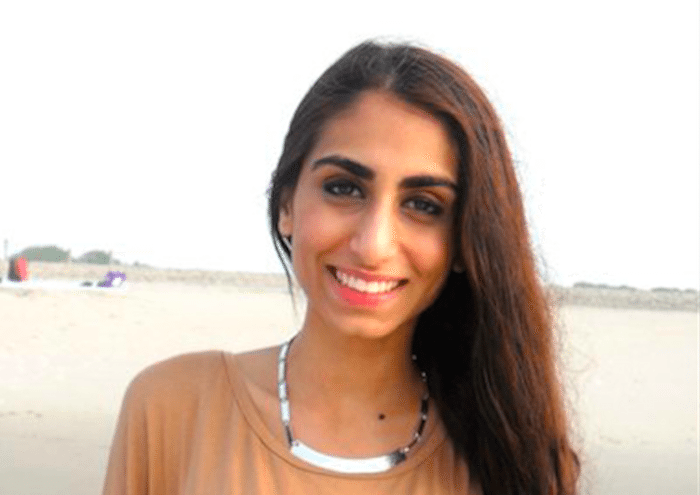

Election night was an emotional moment for Kensington resident Tabir Akhter, Buzzfeed’s deputy social media director and producer of a podcast about being Muslim in America. Like many in the media world, Akhter worked long into the night, as she watched America elect a president whose Anti-Muslim rhetoric felt like an attack.
“I can’t even describe the feeling — I felt cold,” she said. “People in the newsroom were crying, saying ‘I’m LGBTQ, what does this mean for me?” and “I’m black what does this mean for me? We hadn’t prepared for him to win in any way. We had a collection of ‘congrats madam president’ illustrations which seemed like a mausoleum, suddenly.”
Akhter started as one Buzzfeed’s original social media staffers, and now has arrived at a moment in her career where she’s doing what she loves most: making things go viral on social, and building a platform for real Muslim representation in media.

Akhter and I met at Lark on Church Avenue on a damp November evening, and a magnetic force kept pulling our conversation back to the election and its aftermath.
It was exciting to chat with someone who creates a podcast I love, who’s simultaneously speaking to an entire audience but also just to me, or at least that’s how it feels when I’m listening through earbuds on solitary, evening walks. In person, her soft-pitched voice and small frame contrasted sharply with her thoughtful brown eyes and candid conversation.
It took Akhter a full week after the elections to laugh again, but lately, she’s been pulling herself out of the abyss with dark humor. “You have to laugh through the pain,” she said. “I’ve been seeing hilarious tweets like, ‘Can anyone recommend a concealer that will last four years?’”
And, surprisingly, the kindness of New Yorkers is sometimes what gets her through the day. “I had people hug me in the elevator at work, people I only say hi to once in awhile,” she said, smiling and teary-eyed.
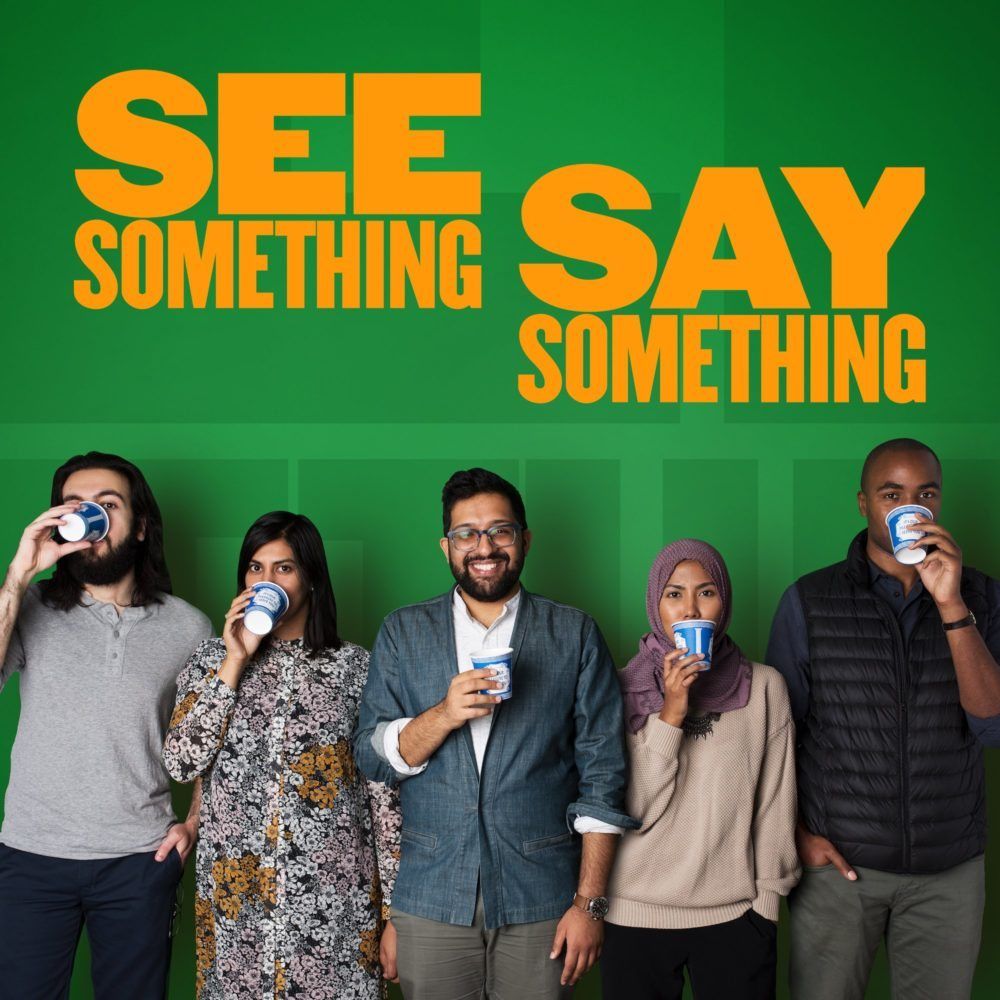
‘See Something Say Something’ is a slogan that all New Yorkers know by heart, from seeing the Homeland Security poster campaign plastered all over the subway. But now, it’s also the title of BuzzFeed’s interview-based podcast that recently made the New York Time’s ‘Best Podcasts of 2016’ list, flipping the phrase’s context from suspicion to conversation starter.
Hosted by writer Ahmed Ali Akbar, See Something Say Something is for Muslims by Muslims and features diverse voices including an Iranian-American comic, an interfaith activist, Muslim NYU students (one of whom wrote an essay about her Trump-supporter roommate for the New York Times), and Ahmed’s dad.
A group flattens into a stereotype when reporters reach out to “the same five or six talking heads” every time they need a statement from a Muslim person, Akter told us. Instead, the podcast crew uses social media to capture stories from all types, “because we’re complete people with varying interests and passions just like you,” said Akhter.
“See Something Say Something is an open invitation to peek inside our world, but also happens to educate people and complicate what it means to be Muslim.”
“And I’ve sent Ahmed snaps of the subway posters, it feels like great promo,” she said.
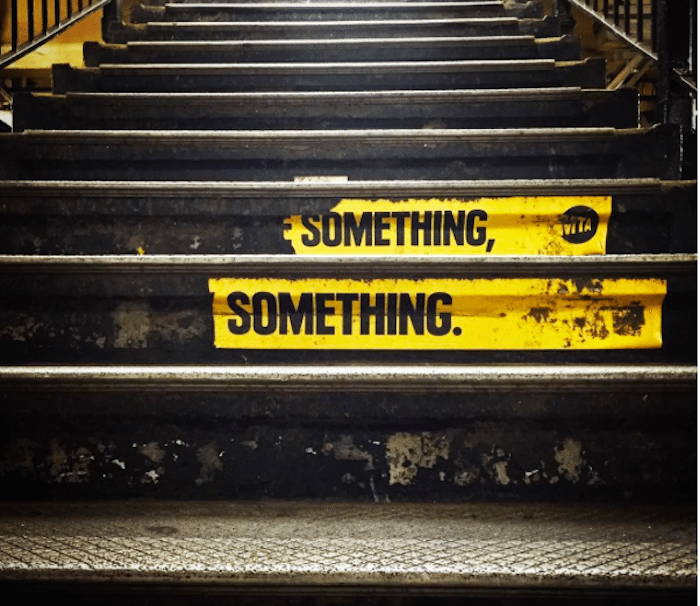
“On this show, I want to remove that burden of representation. We’ll talk about our personal experiences but not for or on behalf of Muslims,” says Ahmed on the podcast’s opening episode, “Saying ‘Nah'”.
And this quality of individual expression makes the show insightful, but also just really fun.
One of my favorite reoccurring segments is ‘Halal or Not’, a quiz-style gameshow where guests judge random items as Halal or Haram. The whole thing is tongue-in-cheek hilarious, even though, as a white girl from the Jersey Shore, the only time I use the word ‘Halal’ is to describe my favorite food carts. ‘Our socks: Halal or not? Frosted Mini-Wheats: Halal or not?’ Listening feels like being let in on an inside joke.
Creating a giant microphone for Muslims
“The best way to understand why people care is to get your hands dirty and do the thing,” Akhter said. While the news team began reporting intensively on xenophobia, a team of Akhter’s coworkers (dubbed HalalFeed) plus the Podsquad (a production team led by producers Eleanor Kagan and Megan Detrie) worked to change Muslim representation in the media world from the inside out.
But rather than promoting the program as a representation of a culture, Akhter thinks of the show as a giant microphone pointed out to her community.
“You start thinking back to the inspiring people in our lives who are just weirdos, and you want people to know about them,” she said.

Akhter lends her voice, social media expertise, and critical eye to the PodSquad (“who are freakin’ awesome at what they do”). Her mission is to refine the show’s direction and bug Ahmed relentlessly about having more teens on the show.
“I’m there to challenge him and give him a little bit of hell,” she said. “Me and Ahmed provide gut checks for each other, for pitching ideas and making content that has the right message. We are aware that the stakes are very high.”
“You feel like you’ve traveled the world but you’ve just gone down Coney Island Avenue”
Akhter grew up on Ditmas Avenue and East 9th Street, and when she moved out of her family’s house she landed only one block away.
“I will cry to say how proud I am to be from Brooklyn,” she said. “We were one of the first Pakistani families on our block, now we’re blocks from a burgeoning Uzbek community and blocks from the cool things on Cortelyou Road — which I thought I’d never see in my lifetime.”
In ways, the local ethnic communities are segmented, but there are small, meaningful pockets of overlap, like in school, and stores where you’ll get Russian bread in your Pakistani halal meat market, and “you’re like, ‘okay, cool.'”
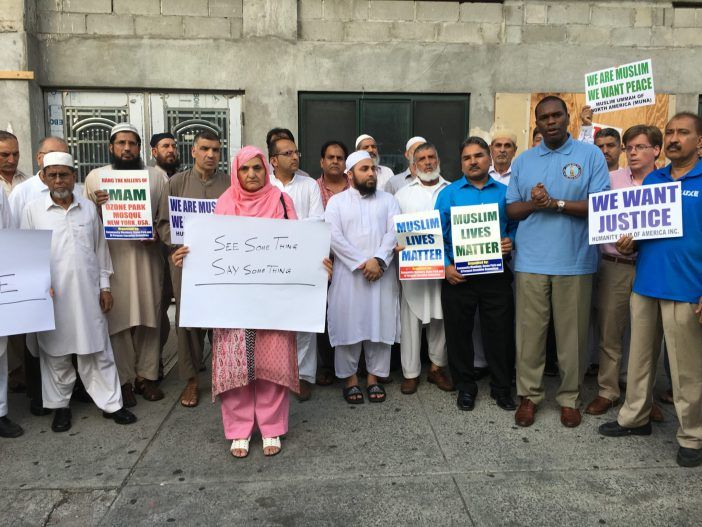
In many ways, her upbringing revolved around the Makki Masjid, a mosque on Coney Island Avenue; where her grandmother’s funeral was held only a month ago; where she’s attended many celebrations and Eid prayers that spilled out onto the Avenue — even though she would be the only woman out there praying on the street.
“In Kensington, I feel like I’m in my bubble and everything is taken care of,” she said.
9/11 and 11/9
Akhter was in Junior High School when 9/11 damaged that bubble and exposed her to the reality of Islamophobia.
“After 9/11, my sister [who wore the Hijab as part of her school uniform] would get threatened and her best friend got beat up on the subway,” she said. “People were angry, and on some level, I understood and internalized that anger — which sucks.”
When she learned that her classmate’s father died fighting the fire at Ground Zero, she began feeling at fault. “The weight of that was so heavy on me. As a kid you don’t understand what’s happening,” she said.
Through the prism of her own life story, she remembers a neighborhood-sized shift. After 9/11, searches and surveillance altered the mood on Coney Island Avenue, engendering a relationship of mistrust between the Muslim community and the police. “Home didn’t feel as safe,” she said. “There are people here who have been asked to spy on their community when they’re just trying to live their lives.”
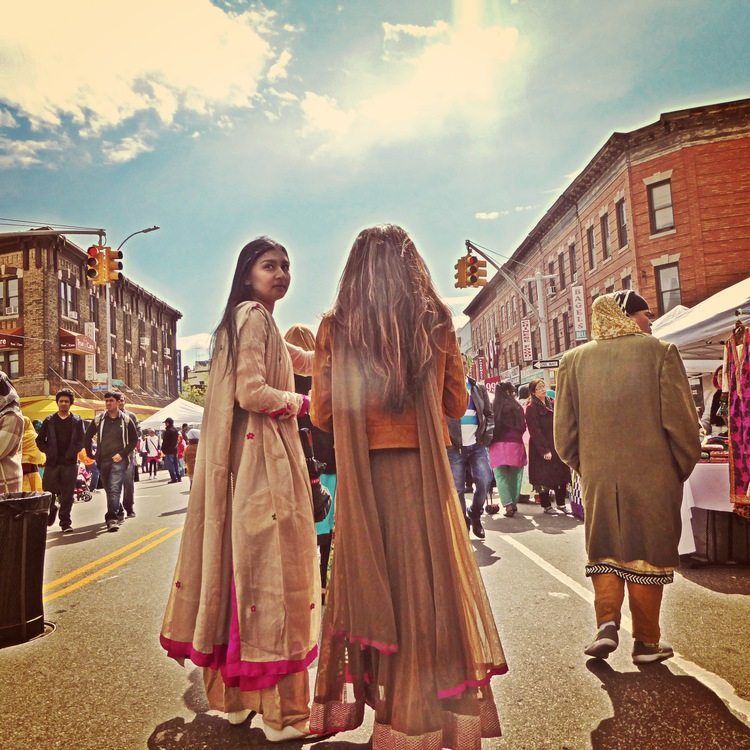
Even during the recent presidential campaign, there was a tendency for both candidates to talk about Muslims only in the context of National Security — like when Clinton challenged a Muslim speaker to be ‘on the front lines of terror‘ during a presidential debate. “We’re not watchdogs. We don’t have any special intel about where the terrorists are, we’re just regular people,” Akhter said.
In episode 4 of the podcast, interfaith activist Hind Makki pinpoints a moment in this year’s town-hall style debate where a Muslim woman stood up and asked the candidates about health care. “That’s what we really care about — health care, jobs, economic policy — we’re just like everyone else,” said Akhter. (Side note: check out Makki’s gorgeous tumblr blog documenting women’s sacred spaces.)
After the election, many writers and activists drew parallels between 9/11 and 11/9 — the feeling of being unsafe, the surge of hate crimes against Muslims. “But the difference now is that there’s an entire generation of people who can stand up for these kids, many of whom were too young to even remember 9/11. We can handle it differently, protect our community, organize, and reach out.”
Listen to one of our young guests (19 years old!) talk about election day and how it felt. pic.twitter.com/q83mHDEr6D
— ahmed ali akbar (@radbrowndads) November 28, 2016
“I’m Pakistani and I sometimes don’t know if I’m doing good for the people around me.” But the most personal, effective way to support your neighbors, Akhter said, is to just ask how you can help — the same way people interact on her Kensington block.
But from her experience coming of age in a post 9/11 world, she does know one thing:
“If you’re growing up in a world where so much of who you are and what you hear about yourself is framed in the context of being a security threat, eventually it seeps in and you’re like, ‘Is that all I am?”
With the podcast, Akhter is saying to the younger generation: “We see you, we know what you’re going through, and that’s not all you are.”
To subscribe to the See Something Say Something podcast, click here. Or listen to a single episode here. You can also follow Tabir Akhter and the SSSS podcast on twitter.



